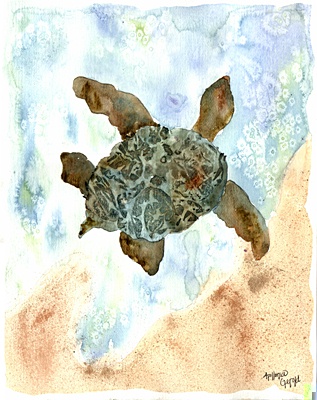All Nonfiction
- Bullying
- Books
- Academic
- Author Interviews
- Celebrity interviews
- College Articles
- College Essays
- Educator of the Year
- Heroes
- Interviews
- Memoir
- Personal Experience
- Sports
- Travel & Culture
All Opinions
- Bullying
- Current Events / Politics
- Discrimination
- Drugs / Alcohol / Smoking
- Entertainment / Celebrities
- Environment
- Love / Relationships
- Movies / Music / TV
- Pop Culture / Trends
- School / College
- Social Issues / Civics
- Spirituality / Religion
- Sports / Hobbies
All Hot Topics
- Bullying
- Community Service
- Environment
- Health
- Letters to the Editor
- Pride & Prejudice
- What Matters
- Back
Summer Guide
- Program Links
- Program Reviews
- Back
College Guide
- College Links
- College Reviews
- College Essays
- College Articles
- Back
The Arabian Sea isn't as calm anymore...
As I stood at the edge of the sea nearly 5 years later, I realized how much had changed. Seaview Karachi was my childhood; no other place in the world compared to how the waves gently drenched the sand, or how the wind made everyone’s worries just fade away. I watched the sunset with an unwavering gaze, as a fiery red orb of light slowly sank beneath the horizon, and threads of light lingered in the sky, mingling with the rolling clouds, dyeing the heavens orange, then yellow, and slowly blending into darkness. Yet, I felt uneasy and uncomfortable, but it was not from nostalgia. I noticed the waters of the Arabian Sea are not as calm anymore, the sand doesn’t shimmer and even the air isn’t as pure.
If I was felt uneasy just looking at the sight before me, how were the creatures inside the polluted, filthy and dirty water surviving? I noticed all kinds of garbage and trash lying on the sandy shores of Seaview and watched as the water slowly took the garbage with it, impacting a wide range of species. The unpalatable effects of pollution were difficult to ignore.
Healthy oceans and the plankton they support provides us with most of the oxygen we breathe and is the habitat for a lot of the main sources of food for humanity. Trees sequester carbon, give off oxygen, filter contaminants in air and water, and prevent erosion and flooding. Polar ice caps balance global temperatures and ocean currents. From the smallest microbes to the largest mammals, biodiverse animal life keeps natural systems balanced, ensuring that every creature in the food web, including us, humans receive food. Loss of forest cover, wetlands, insect populations, biodiversity and more is having catastrophic impacts on food security, climate change adaptation, and global economies.
Due to human activities and increased development, It's estimated that half of all the species on the planet could go extinct by 2050 — only 30 years from now. When deforestation takes place to fulfill the demands of the increasing population or to claim land for agriculture, we destroy unique ecosystems that can not exist anywhere else, and by destroying the habitats of various species, we cause extinction rates to increase. Garbage dumped into the oceans, chemical runoff from industrial operations, and air pollution from cars and factories make the survival of various species extremely difficult. Though the climate is bound to change over time, human processes are rapidly increasing the rate of climate change and since species can't adapt quickly enough, they’re going extinct, resulting in biodiversity loss.
Now, the youth who is inheriting this mess is demanding action from their leaders who have failed to fulfill their promises. From student climate strikes run by Greta Thunberg to calls for a “green new deal,” young people are letting those in power know that time is running out and their ignorance of global environmental issues is unacceptable. Some signs are promising. Biodiversity loss is on the G8 agenda for the very first time, and countries like China and the U.K. have started looking into solutions.
The doughnut economic model adopted by Amsterdam shows the needs of the planet and humanity can be balanced out using key strategies. In the model, the doughnut’s inner ring is based on the UN’s sustainable development goals and includes necessities like clean water, housing, gender equality, work, and education. The doughnut’s outer ring represents working towards planetary health that avoids damaging the climate, soils, oceans, and biodiversity. This model aims to create a balanced economy that meets immediate needs while ensuring a sustainable future.
In Vietnam, at the Quang Nam Elephant Reserve resident elephants often travel away from the protection of the reserve to search for new food sources. They look for local gardens and agriculture fields, threatening the livelihood of community members and putting their own safety at risk.
The Green Fence Restoration Project is changing that by planting over a mile of Bo Ket, a native tree with sharp, dense thorns covering its trunk and branches. The tree grows relatively quickly and acts as a natural barrier for elephants. In addition to reducing human and wildlife conflicts, Bo Ket leaves are a key ingredient in products like traditional medicine and shampoo, providing an income-generating opportunity. Such efforts give us hope, and also show how humans and animals can peacefully coexist while fulfilling their own needs.
Many people all over the world are fulfilling their responsibility - driving and flying less, eating less meat, making greener consumer choices, reducing and recycling, and most importantly, taking to the streets and demanding action. Scientists have offered a range of solutions, we must actively protect our planet, starting now!

Similar Articles
JOIN THE DISCUSSION
This article has 0 comments.
